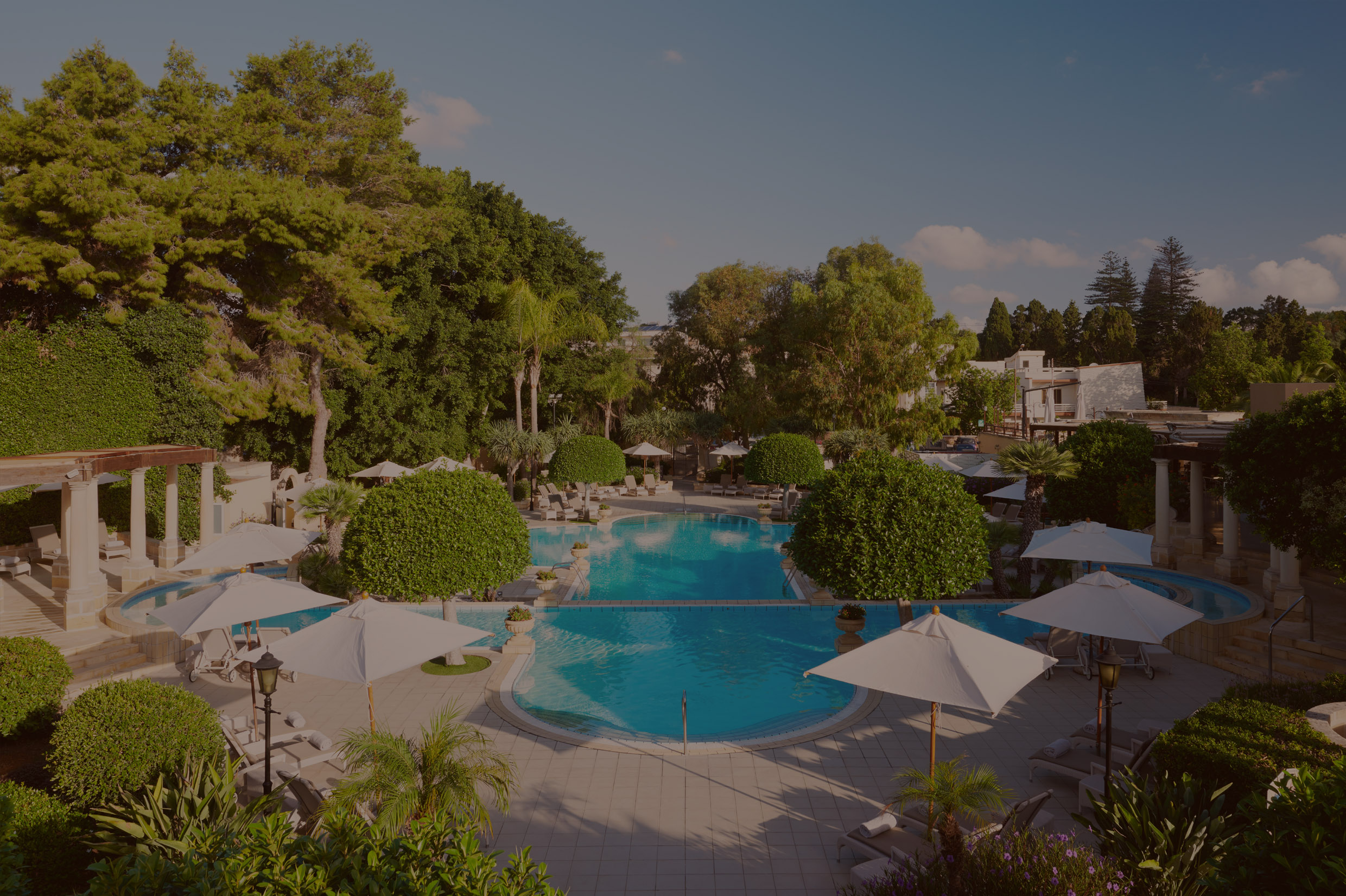
Corinthia Palace: From Attard to the Upper East Side
December 21, 2024

Promoting the Maltese Islands Internationally is an Ongoing Endeavour
December 21, 2024
The First Catering Course: The Birth of ITS
December 23, 2024With Alexandra Pisani at the helm, Corinthia Palace has entered a new, revitalised era.
And with the Group poised for several high-profile, international launches – the latest being New York – the stage is set for the spirit of the Palace’s quiet sense of luxury to go well and truly global.
Horeca sits down with Corinthia Group CEO Simon Naudi and Corinthia Palace General Manager Alexandra Pisani to discover more.
As Corinthia Group announces new hotel launches in several high-end, global locations, never has the original spirit of the Corinthia Palace been so strong within the brand identity - or so eclectic. Indeed, since general manager Alexandra Pisani took the helm in 2021, Corinthia Palace has taken a significant leap forward with an evolution that is as organic as it is exciting.
Among the notable additions are Josephine’s Cafe and a partnership with Chef Francesco Mazzei at Villa Corinthia, both of which have added another dimension to the Hotel’s food and drink offerings. A new lobby, the introduction of a new room category and even more upgraded suites, complete the picture.
The Corinthia Palace may be the sophisticated grand dame of luxury hotels on the Islands, but Pisani’s touch has also rendered it undeniably attractive to a much younger demographic that includes millennials and Gen X. And the results are already showing, with the Hotel guests’ profile enjoying a significant revival.
“We’ve certainly seen an increase of interest from younger guests since we’ve embarked on this new vision. And they have been quite upfront about what they’re loving about this new iteration of the Corinthia Palace. They particularly value health and wellbeing, they care about what they put in their bodies, and about the impact this has on the environment, and our ethos very much reflects all of this. Our plant-based approach at Josephine’s Cafe is but one example in this regard, and it has created quite a stir,” Pisani starts off.
The same goes for the partnership with Chef Francesco Mazzei, which was originally intended to be a residency but has now turned into a permanent collaboration. Mazzei brings with him a dining experience that also resonates with the current culture and values of a younger generation.
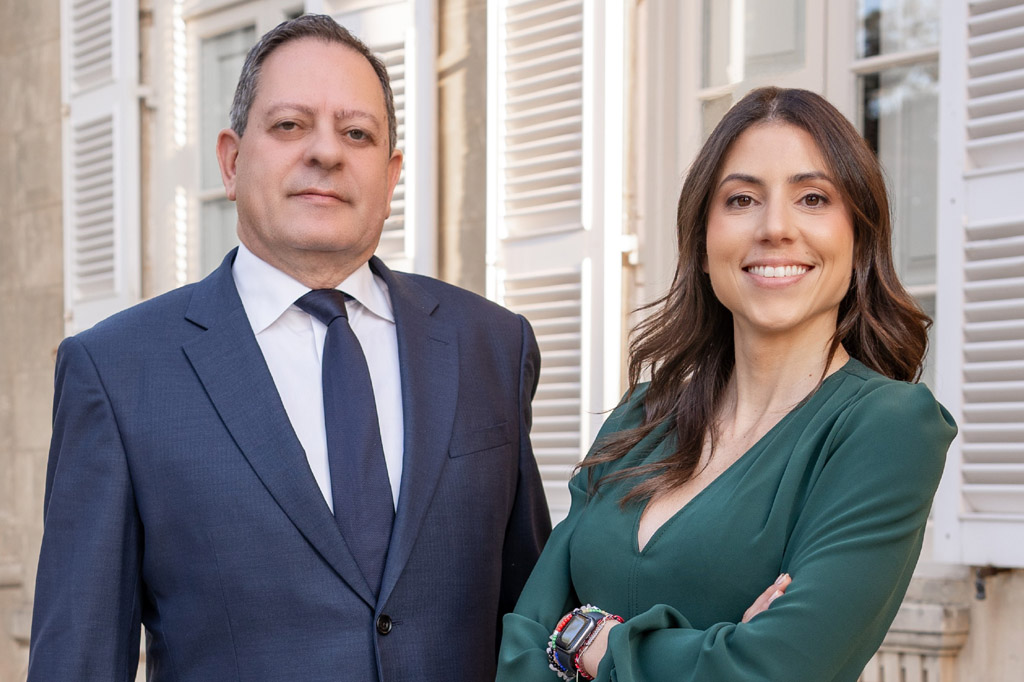
From left: Simon Naudi and Alexandra Pisani
The menu, Pisani says, follows a farm-to-fork approach
as much as possible, with a very low food radius.
“The furthest ingredients are from Calabria, so the carbon
footprint is kept low. It’s very gratifying to see Corinthia
Palace leading the way in both our main offerings when it
comes to sustainability in food trends.”
She has also introduced an element of ‘slowness’ to the hotel, an aspect that millennials typically search for in high-end experiences, alongside quiet luxury - which the Palace takes to the next level.
“Our hotel programme is very much immersed in the community, allowing guests to enjoy an experiential stay at their own pace,” she concludes. “And we are also introducing a cultural aspect, collaborating with artists and theatre companies to include a fusion of the arts in our hotel stays and events.”
Last summer’s production of Shakespeare’s ‘The Tempest’, produced by WhatsTheirNamesTheatre, is a case in point. Staged around the outdoor pool itself, which the actors used to deliver a re-imagined Shakespeare, the production was one of the most talked about events among the younger theatre crowd. And the glint in Alexandra’s eye suggests there’s plenty more where that came from.
“The Corinthia Palace is a very special part of our brand. It’s where everything started in 1962, and where you can really feel the soul of Corinthia here. Our vision is always to remember the legacy, but also to be at the forefront of hotel trends and to stay relevant, especially now that we’re playing in such an international sphere,” Pisani says.
Her vision for the “Palace” is to continue strengthening its prominence among the Group’s portfolio. As the “spiritual home” of Corinthia, it is set to inform the slew of international openings which include a new luxury hotel in New York, an upcoming launch planned for Brussels’ Rue Royal, and more properties in Rome, Bucharest, Riyadh and Doha set for 2025 and beyond. Corinthia Hotels’ global growth strategy is undeniably on a powerful upward trajectory.
I turn to Simon Naudi, Corinthia Group CEO, to learn more about how these investments fit within the general Corinthia Group portfolio.
“It’s important to note that there are three facets to the brand. We own 15 hotel properties around the world; we also build and develop properties. And we identify projects and raise funding for them as a developer. We are growing globally across all three fronts,” Naudi starts off.
In some cases - such as the upcoming Corinthia Brussels property - the Group runs the hotel as both owner and developer. In others, like The Surrey in New York, a partner is brought in to invest in the physical venue, while Corinthia is in charge of management, running it as a Corinthia Hotel.
“No matter what the logistics are, the common theme is that these are all luxury brands. In New York we entered straight at the top, in a high-end Upper East Side of Manhattan, steps away from Central Park,” Naudi elaborates. “And it will be the same for all the upcoming properties.”
Indeed, luxury investments with a strong historical identity underpin the Corinthia Hotels brand. When the flagship Corinthia London opened in 2011 it was right in the heart of Westminster on the site of the former, historic Metropole Hotel. The upcoming Corinthia Brussels, in Notre Dame aux Neiges, is a 120-year-old Belle Époque jewel with strong ties to the royal family. In Bucharest it will be the same, with the hotel representing an iconic landmark originally built in 1867. In Rome, the hotel is situated within a grand, neoclassical palazzo that used to serve as the Central Bank of Italy. The Saudi Corinthia Riyadh is part of development nestled alongside other ultra-luxury hotel brands like Bvlgari, Armani and Baccarat. This approach is reflected in all the other hotel projects that are in the pipeline.
Naudi confirms that this drive towards highlighting the luxury aspect of the Corinthia brand is part of the Group’s strategy.
“Within a year and a half, Corinthia will consolidate our position as a world player and we envision that the new projects will have a snowball effect, with more people knocking on our door to work with us on more projects. Corinthia is well underway to being on a par with brands like the Mandarin and the Four Seasons in the world of luxury hotels,” Naudi states.
She has also introduced an element of ‘slowness’ to the hotel, an aspect that millennials typically search for in high-end experiences, alongside quiet luxury - which the Palace takes to the next level.
“Our hotel programme is very much immersed in the community, allowing guests to enjoy an experiential stay at their own pace,” she concludes. “And we are also introducing a cultural aspect, collaborating with artists and theatre companies to include a fusion of the arts in our hotel stays and events.”
Last summer’s production of Shakespeare’s ‘The Tempest’, produced by WhatsTheirNamesTheatre, is a case in point. Staged around the outdoor pool itself, which the actors used to deliver a re-imagined Shakespeare, the production was one of the most talked about events among the younger theatre crowd. And the glint in Alexandra’s eye suggests there’s plenty more where that came from.
“The Corinthia Palace is a very special part of our brand. It’s where everything started in 1962, and where you can really feel the soul of Corinthia here. Our vision is always to remember the legacy, but also to be at the forefront of hotel trends and to stay relevant, especially now that we’re playing in such an international sphere,” Pisani says.
Her vision for the “Palace” is to continue strengthening its prominence among the Group’s portfolio. As the “spiritual home” of Corinthia, it is set to inform the slew of international openings which include a new luxury hotel in New York, an upcoming launch planned for Brussels’ Rue Royal, and more properties in Rome, Bucharest, Riyadh and Doha set for 2025 and beyond. Corinthia Hotels’ global growth strategy is undeniably on a powerful upward trajectory.
I turn to Simon Naudi, Corinthia Group CEO, to learn more about how these investments fit within the general Corinthia Group portfolio.
“It’s important to note that there are three facets to the brand. We own 15 hotel properties around the world; we also build and develop properties. And we identify projects and raise funding for them as a developer. We are growing globally across all three fronts,” Naudi starts off.
In some cases - such as the upcoming Corinthia Brussels property - the Group runs the hotel as both owner and developer. In others, like The Surrey in New York, a partner is brought in to invest in the physical venue, while Corinthia is in charge of management, running it as a Corinthia Hotel.
“No matter what the logistics are, the common theme is that these are all luxury brands. In New York we entered straight at the top, in a high-end Upper East Side of Manhattan, steps away from Central Park,” Naudi elaborates. “And it will be the same for all the upcoming properties.”
Indeed, luxury investments with a strong historical identity underpin the Corinthia Hotels brand. When the flagship Corinthia London opened in 2011 it was right in the heart of Westminster on the site of the former, historic Metropole Hotel. The upcoming Corinthia Brussels, in Notre Dame aux Neiges, is a 120-year-old Belle Époque jewel with strong ties to the royal family. In Bucharest it will be the same, with the hotel representing an iconic landmark originally built in 1867. In Rome, the hotel is situated within a grand, neoclassical palazzo that used to serve as the Central Bank of Italy. The Saudi Corinthia Riyadh is part of development nestled alongside other ultra-luxury hotel brands like Bvlgari, Armani and Baccarat. This approach is reflected in all the other hotel projects that are in the pipeline.
Naudi confirms that this drive towards highlighting the luxury aspect of the Corinthia brand is part of the Group’s strategy.
“Within a year and a half, Corinthia will consolidate our position as a world player and we envision that the new projects will have a snowball effect, with more people knocking on our door to work with us on more projects. Corinthia is well underway to being on a par with brands like the Mandarin and the Four Seasons in the world of luxury hotels,” Naudi states.
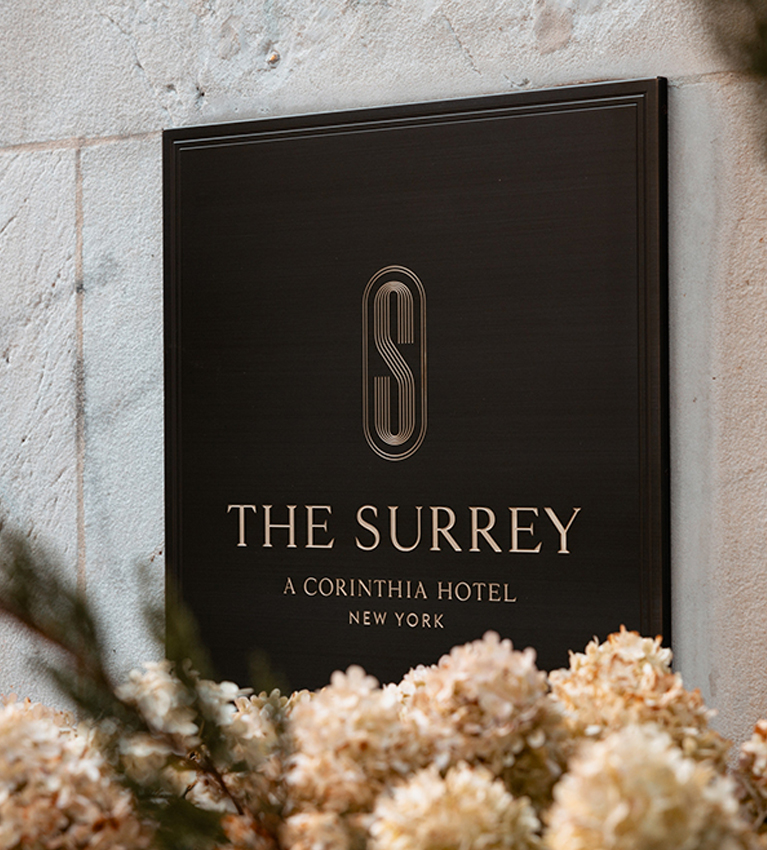
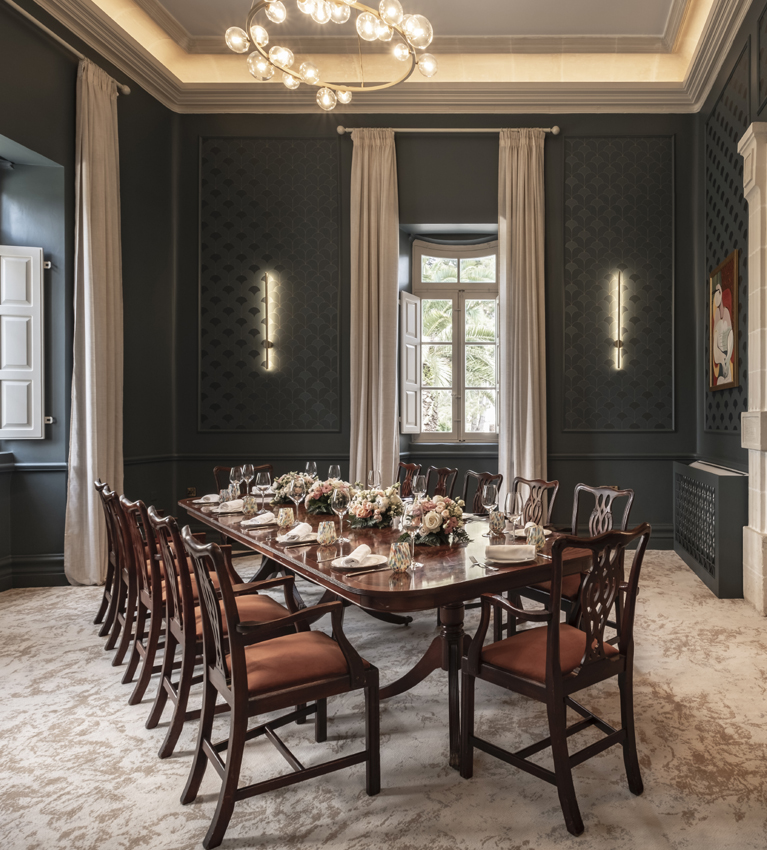
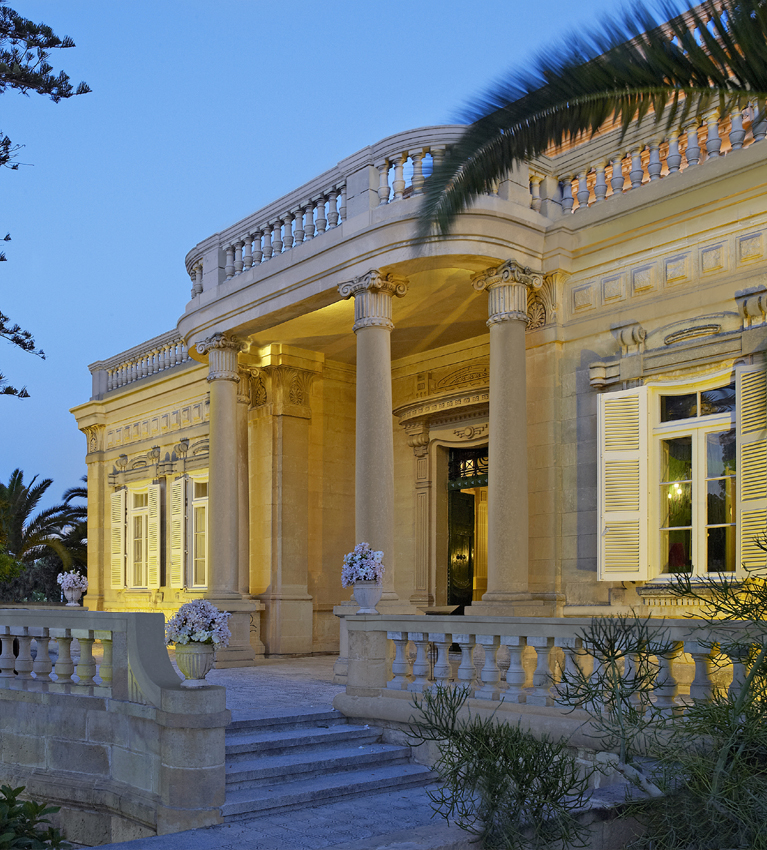
This pride in the Corinthia name is evidently at the heart of all projects, a fact that Naudi acknowledges, explaining that the brand is always part of whatever the Group invests in. The strategy has paid off, and nowadays the word Corinthia carries immense goodwill.
“To get where we are today we needed to build the Corinthia brand itself. Nobody wants you to run their hotel if you don’t have a strong track record. After we launched the London property we realised that the name has a very high value attached to it, and we needed to be very protective of its integrity and of the philosophy behind it. This is when we really started focusing on the luxury segment,” Naudi says.
This strategy led them to rebrand other investments that, while having their own financial and investment strengths, don’t fit into the luxury niche. The Prague property is one such example, no longer branded as Corinthia and re- christened as The Grand Hotel Prague Towers.
“It remains an excellent investment, but it’s being run as a different brand. And we may follow suit with other hotels that don’t fit the luxury niche, too,” Naudi confirms. Meanwhile, the other brand commonality is what he describes as “the spirit” of the hotels, the family-inspired brand that is the other Corinthia USP.
“There are many successful brands around the world, but we have a sincerity to our approach that underpins our identity. Our founder and chairman Alfred Pisani reminds us all, every day, that everyone working in the Group is part of our family. Our spirit is the commonality which brings all our international hotels together, because the properties themselves are very different. You can’t have a brand that looks the same in the Maldives as it does on the Upper East Side of Manhattan. But the one thing that can be the same is the smile that we bring to people’s faces.”
He emphasises that each hotel has a different identity that reflects the location, and this extends to the food and beverage side. In New York there’s Casa Tua, which is a leading American brand. In London there’s Tom Kerridge, another huge British name. Rome will host Italian celebrity chef Carlo Cracco, while Brussels will have a Belgian brasserie by Michelin star Belgian Chef Christophe Hardiquest.
“These are all very different elements that reflect the culture we’re operating in. But the HR side of the company is critical to our success, because that remains constant,” Naudi concludes.
Click here to see Horeca Issue 18 online



